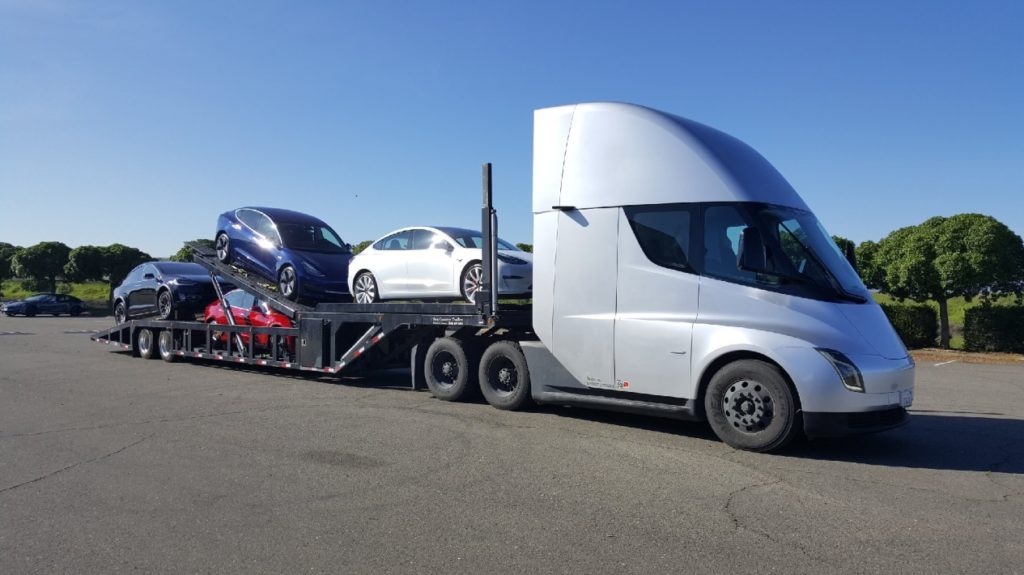The Tesla Semi might be receiving a lot of interest from companies and the electric vehicle community as a whole, but an automotive technology expert from Germany is not that impressed. In a statement, Chair of Automotive Engineering at the Technical University of Munich Markus Lienkamp criticized all-electric trucks like the Tesla Semi, stating that such vehicles are pretty much pointless in the economic and ecological sense.
“The battery for a Tesla Semi must have a capacity of about 1000 kWh, per 100 kilometers about 130 kilowatt-hours. This is technically not easily feasible and it’s also pointless both economically and ecologically,” he said.
Lienkamp’s scathing criticism comes on the heels of a study from Transport and Environment, a consortium of European environmental organizations that conducted a study comparing the energy consumption and environmental costs of conventional diesel trucks and their all-electric counterparts. Two diesel trucks were used for the study: one with an average consumption of 33 liters per 100 kilometers (around 7 mpg) and a more aerodynamic truck with a consumption of 22 liters per 100 km (10.69 mpg).
The results of Transport and Environment’s study found that diesel trucks consume between 2.2-3.3 kilowatt-hours per kilometer, far above the consumption of an average electric truck, which requires 1.44 kWh per km. Electric vehicles that are designed from the ground up for maximum efficiency such as the Tesla Semi require just 1.15 kWh per km. The study’s authors concluded that overall, using all-electric trucks reduces energy consumption by a factor of 1.5-2.9.
All-electric trucks surpass diesel trucks in terms of efficiency as well. The study revealed that a diesel truck engine has an efficiency of 20-45% on long-haul routes and a measly 10% in city traffic. In comparison, electric trucks have a 90% efficiency for long routes and 75% in urban traffic. Lienkamp is not convinced, arguing that the source of the electricity used by vehicles like the Tesla Semi affects efficiency.
“The efficiency of the electricity mix used for the truck battery is important. If the energy comes from a gas-fired power plant, for example, the overall efficiency quickly drops back to 40%. If, on the other hand, 80% to 90% of the electricity comes from renewable sources, as planned in the EU for 2040, long-distance trucks would be attractive from an ecological point of view,” he said.

The authors of the study maintained that electric trucks are cheaper to repair and maintain simply because they have fewer moving parts. Even brakes will rarely need replacing, thanks to systems like regenerative braking. While these are compelling advantages, Lienkamp stated that “for distances of 500 kilometers and beyond, battery-powered trucks simply won’t make any economic sense until 2030,” adding “with electric vehicles, the cost of trying to reduce CO2 levels is simply too high.”
It should be noted that the Tesla Semi, at least in its upcoming iteration, is not designed to enter the long-haul market that is dominated by trucks that can go over 1,000 miles in one full tank. Rather, the Tesla Semi is designed to compete in short-range routes that range from 300-500 miles. From this perspective, it becomes difficult to argue against the Tesla Semi.
The Tesla Semi is a Class 8 truck, and with its four Model 3-derived electric motors, the all-electric long-hauler is capable of sprinting from 0-60 mph in just 5 seconds without a trailer. With a full load, the Semi can reach highway speeds in 20 seconds, far quicker than conventional diesel trucks. The Tesla Semi is currently undergoing real-world tests, in preparation for its production, which is expected to start either this year or sometime in 2020.

<!–
–>
